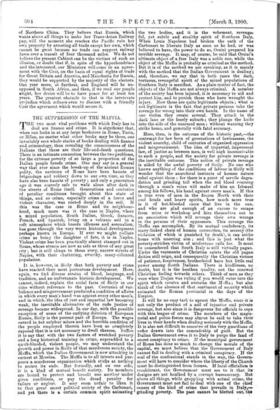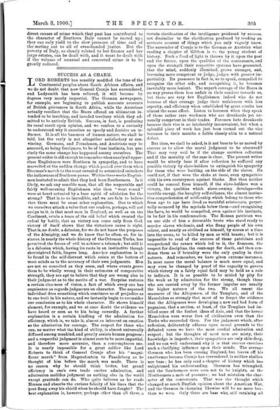THE SUPPRESSION OF THE MAFFLA.. T HE two most vital problems
with which Italy has to deal are finance and crime. It is significant that, when one looks in at any large bookstore in Rome, Turin, or Milan, no matter what other books may be there, one invariably sees whole stacks of books dealing with finance and criminology, thus revealing the consciousness of the Italians that these are their life-and-death questions. There is an intimate connection between the two problems, for the extreme poverty of so large a proportion of the Italian people breeds crime. One may say in a general way that ever since the break-up of the ancient Roman polity, the environs of Rome have been haunts of brigandage and robbery down to our own time, as they have also been haunts of poverty ; and only a generation ago it was scarcely safe to walk alone after dark in the streets of Rome itself. Generations and. centuries of peculiar conditions brought about this state of things, and so crime, especially crime of a fierce and violent character, was rooted deeply in the soil. If this was the case in Rome and its neighbour- hood, much more was it the case in Naples, where a mixed population, South Italian, Greek, Saracen, French, and Spanish, living on a volcanic soil in a soft atmosphere which breeds idleness and sensualism, has gone through the very worst historical development perhaps known in Europe. If ever we might p L]liate crime as being the daughter of fate, it is in Naples. Violent crime has been practically almost stamped out in Rome, whose streets are now as safe as those of any great city ; but it still clings to those steep, narrow streets of Naples, with their chattering, swarthy, many-coloured population.
It is, however, in Sicily that both poverty and crime have reached their most portentous development. Here. again, we find diverse strains of blood, language, and tradition, and an unfortunate historic development. We cannot, indeed, explain the social facts of Sicily in our time without reference to the past. Centuries of tur- bulence and misgovernment produced a condition of affairs in which every man's hand was against every other man's, and in which, the idea of just and impartial law becoming weak, the inevitable alternative of the rude justice of revenge became widespread. In our day, with the possible exception of some of the outlying districts of European Russia, Sicily is the poorest part of Europe. The wages earned in her sulphur mines and the horrible condition of the people employed therein have been so completely exposed that it is not necessary to dwell thereon. Suffice it to say that with the two factors of wretched poverty and a long historical training in crime, superadded to a quick-blooded, violent people, we may understand the growth and power in Sicily of that murderous society, the Maffia,, which the Italian Government is now attacking in earnest at Messina. The Maffia is to all intents and pur- poses .a murderous organisation which sticks at nothing to secure its ends. But formally, and on one side, it is a kind of mutual benefit society. Its members are bound to protect and benefit one another under given conditions, or pay the dread penalty for failure or neglect. It may seem unfair to liken it to that great secret political society of the Carbonari, and yet there is a certain common spirit animating the two bodies, and it is the vehement, revenge. ml, yet subtle and stealthy spirit of Southern Italy. When Louis Napoleon had broken the oath of the Carbonari to liberate Italy as soon as he had, or was believed to have, the power to do so, Orsini prepared his terrible revenge. It may, of course, be said that Orsini's ultimate object of a free Italy was a noble one, while the object of the Maffia is probably as criminal as the method. But it is of the method we are speaking, as it is mainly with the method that the Italian Government is dealing ; and, therefore, we say that in both cases the dark, tortuous, revengeful spirit of the mixed populations of Southern Italy is manifest. As a plain matter of fact, the objects of the Maffia are not always criminal. A member of the society has been injured, it is necessary to aid and protect him, and to punish those who have wrought the injury. Now these are quite legitimate objects ; what is not legitimate is the fact that private persons take the revenge for wrong into their own hands. In the name of one victim they create several. They attack in the dark lane or the lonely suburb ; they plunge the knife into the side of the unarmed man ; without warning they strike home, and generally with fatal accuracy.
Here, then, is the outcome of the historic past,—the contempt for law born of generations of lawlessness, the violent anarchy, child of centuries of organised oppression and misgovernment. The idea of impartial, impersonal law, of justice as between men, is well nigh inconceivable to such a people, and the society for private revenge is the inevitable outcome. This notion of private revenge is aided by the awful poverty of Sicily. No one who knows anything of the conditions of labour in Sicily will wonder that the anarchical instincts of human nature rebel against them ; for there is a point of servile degra- dation and grinding toil when the red blood coursing through a. man's veins will make of him an Ishmael among his fellows, his hand against every man's. If this is true even of men in the frozen North with their cool heads and heavy spirits, how much more true is it of hot.blooded races that live in the sun, and who are glad enough of an excuse to escape from mine or workshop and hire themselves out to an association which will revenge their own wrongs in the persons of their oppressors. This revenge the Maffia can accomplish. By its mutual confederacy, its many-linked chain of human connection, its secrecy (the violation of which is punished by death), it can strike home with unerring aim ; and this is just what the poverty-stricken victim of misfortune calls for. It must be remembered that South Italy is still virtually pagan. Under the vestments of Christian saints the old pagan deities still reign, and consequently the Christian virtues of patience, forgiveness, brotherhood have but little real power among South Italians. There is kindliness, no doubt, but it is the heathen quality, not the renewed. Christian feeling towards others. Think of men as they were when Trajan was ruling if you would enter into the spirit which creates and sustains the Miffia ; but also think of the absence of that sentiment of security which animated the Roman provincial in the days of the Empire.
It will be no easy task to uproot the Maffia, since it is not only the product of a soil of injustice and private revenge, but also since it is dangerous for officials to cope with this league of crime. The members of the magis- terial and police forces may almost be said to take their lives in their hands when dealing seriously with the Maffia. It is also not difficult to conceive of the very guardians of order drawn into the comradeship of guilt. But the Italian Government owes it to Italy to purge the land of secret conspiracy to crime. If the municipal government of Rome has done so much to change the morale of the capital, we must believe that the Government of Italy cannot fail in dealing with a criminal conspiracy. if the seal of the confessional stands in the way, the Govern- ment will have to consider where the liberty of the Church must be distinguished from license. If local officialism is recalcitrant, the Government must see to it that its designs are not baulked by a corrupt bureaucracy. But above all things, while grappling with actual crime, ths Government must not fail to deal with one of the c4ief causes of the kind of crime that prevails in Italy,-■ grinding poverty. The past cannot be blotted out, the
direct causes of crime which that past has contributed to the character of Southern Italy cannot be rooted up ; they can only yield to the slow pressure of time and of the meting out to all of even-handed justice. But the poverty of Italy, so closely related to her finance and her large estates, can be dealt with, and it must be dealt with if the volume of unusual and concerted crime is to be greatly reduced.







































 Previous page
Previous page